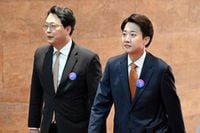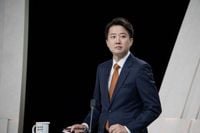A petition demanding the dismissal of Reform Party lawmaker Lee Jun-seok has swiftly gained traction, prompting the National Assembly to initiate a formal review of the case. The petition, which accuses Lee of using violent and inappropriate language related to women's bodies during a presidential TV debate, has ignited a fierce political and public controversy in South Korea.
According to the National Assembly's official petition website, the petition titled "Petition on the Dismissal of Lawmaker Lee Jun-seok's Lawmaker Position" was launched on June 4, 2025. Within just two days, it amassed over 156,000 signatures—well beyond the 50,000 threshold required for it to be automatically referred to a standing committee for review. As of the afternoon of June 6, 2025, the petition had garnered 156,527 consents, reflecting widespread public concern and engagement.
The controversy centers on Lee Jun-seok's remarks during the third presidential candidate debate on May 27, 2025. During the televised event, Lee, who was both a Reform Party presidential candidate and a sitting member of the 22nd National Assembly, referenced a comment allegedly made by Lee Jae-myung's son, Lee Dong-ho. Lee Jun-seok asked fellow candidates whether a statement involving a violent and graphic description of a woman's body part constituted misogyny. Specifically, he inquired, "If someone says about a woman, 'I want to pierce a hole in her genitals or something like that,' does this constitute misogyny?" This question was posed to his opponents, including Lee Jae-myung, the Democratic Party candidate, and Kwon Young-guk, the Democratic Labor Party candidate.
The petitioners argue that Lee's use of such violent and sexually charged language to attack an opposing candidate constitutes verbal sexual violence and violates the dignity expected of a National Assembly member. They assert that this act is unprecedented in constitutional history, describing it as "using women's bodies as a tool for political attacks." The petition further states that Lee's behavior severely undermines public trust and tarnishes the dignity of the National Assembly, which represents all sovereign citizens and is responsible for legislative activities aimed at eradicating discrimination and hatred against minorities.
Specifically, the petition claims that Lee Jun-seok's actions violate Article 46, Paragraph 1 of the Constitution, which mandates a duty of integrity for National Assembly members, and Article 155, Paragraph 16 of the National Assembly Act, which outlines disciplinary regulations including ethical standards for lawmakers. As a result, the petition demands Lee's dismissal from his parliamentary seat.
According to the Constitution's Article 64, dismissing a National Assembly member requires the approval of two-thirds or more of the sitting members, making the process both rigorous and politically significant. The National Assembly has yet to decide which standing committee will handle the petition's review.
Lee Jun-seok's controversial remarks have sparked intense public backlash and are believed to have contributed to a decline in his approval ratings following the debate. In response to the criticism, Lee issued apologies on May 28 and May 30, 2025. However, he also expressed defiance, holding a press conference on May 30 where he accused the Democratic Party and its allied groups of attempting to remove him from office. He described this as "a clear battle against dictators like Lee Jae-myung, sophists like Yoo Si-min, and conspiracists like Kim Eo-jun."
On June 5, 2025, at the Reform Party's election countermeasures headquarters disbandment ceremony, Lee expressed some regret over his remarks, stating, "If I were to go back to the third TV debate, I would not have done that." This admission came after days of heated debate and political fallout.
The Reform Party's interim leader, Chun Ha-ram, acknowledged the negative impact of the controversy in a KBS radio interview on June 6, 2025. He remarked, "The controversy ultimately did not help," adding that it affected Lee's individual competitiveness and contributed to a psychological reluctance among voters to support him. Chun also noted the party's limited capacity to support Lee fully due to its weakened state, suggesting that public skepticism about the party's preparedness played a role in the unfolding events.
The petitioners also highlighted Lee Jun-seok's broader pattern of behavior prior to the debate, accusing him of consistently promoting discriminatory and divisive rhetoric. They cited his tendency to frame social issues within a binary of "citizens" versus "non-citizens," which they argue fueled discrimination and incited political division.
Lee's defenders might argue that his comments were a strategic attempt to expose alleged misogyny linked to his political opponents, and that his subsequent apologies indicate a willingness to acknowledge missteps. However, critics maintain that the severity and nature of his language crossed a line, violating ethical and constitutional standards expected of elected officials.
As the National Assembly prepares to review the petition, the political atmosphere remains charged. The case raises important questions about the boundaries of political discourse, the responsibilities of lawmakers to uphold dignity and respect, and the mechanisms available to hold public officials accountable for misconduct.
With the petition surpassing the required signatures in record time, it clearly reflects a significant public outcry. Whether the National Assembly will muster the two-thirds majority needed to dismiss Lee Jun-seok remains uncertain, but the process itself underscores the gravity with which these allegations are being treated.
In the broader context, this episode highlights ongoing societal debates in South Korea about gender, political rhetoric, and the standards to which public figures are held. It serves as a potent reminder that words in the political arena carry weighty consequences, not only for individual careers but for the trust and cohesion of the democratic system itself.


